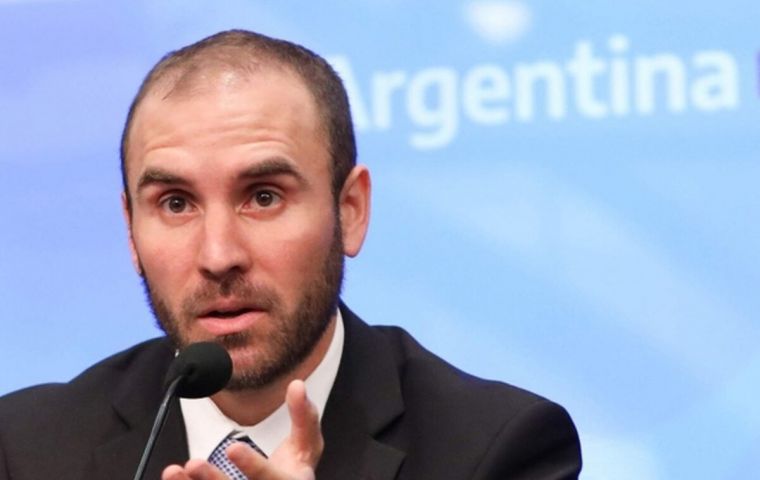MercoPress. South Atlantic News Agency
Argentine Economy Minister wants common tax on multinational companies higher than 15%
 “The markets are not going to provide the type of financing that economies need,” said Guzmán
“The markets are not going to provide the type of financing that economies need,” said Guzmán Argentina's Economy Minister Martín Guzmán Friday requested that a global tax to be applied to multinational companies was higher than the 15% put forward by the Organization for Economic Cooperation and Development (OECD).
Guzmán made those remarks during his appearance at the G20 Summit of Economy Ministers in Venice, Italy.
The Minister celebrated the initiative to advance with international taxation of multinational companies, although he requested the application of a higher rate than the one currently being discussed of 15%.
“We think that a global tax of at least 15% is a very positive step, but of course more would be better,” said Guzmán at a round table on productivity. Guzmán's stance was supported by his French colleague Bruno Le Maire.
“The first bilateral meeting at the # G20 was with the South Korean Minister of Economy, Hong Nam-Ki. We reached understandings on key multilateral issues such as being able to redistribute SDRs to middle-income countries and comprehensively review the IMF's surcharge policy,” said Guzmán on Twitter.
The summit of finance ministers and bankers from the G20 member countries started Friday in Venice to agree on a reform regarding the taxation of multinationals and ending tax havens as well as “fiscal dumping”.
The idea is to establish a global minimum tax of at least 15% on the profits of multinationals, which could radically change the current architecture of international taxation.
During his presentation, Guzmán considered that for Argentina, “the topics of the panel are at the centre of the policy agenda and what we intend is to create a society that manages to develop knowledge, a society that achieves a good path of human and social development and that this happens inclusively. ”
He also insisted digital inclusion was a “key objective that we want to achieve to make use of the talent that our society has.”
”We also know that we face different challenges than the challenges advanced economies face when it comes to achieving similar goals. And history teaches us that previous so-called industrial revolutions, while increasing the standard of living of many people in many parts of the world, they also created more inequality, and now we live in critical times in which there are serious threats to what can happen in terms of inequality,“ he added.
In addition to inequality, Guzmán highlighted what he believed was the world economy's other problem - climate change. “And the solutions to these two problems are interrelated. Inequality, which is a symptom of dysfunctional rules for the global economy, and which is both a cause and a consequence of dysfunctional social systems; a goal of multilateralism should be to avoid an uneven evolution of the global economy after the impact of Covid-19,” the Argentine minister said.
Guzmán also underlined that “the state plays an important role in terms of investments in education and research and development and specialized programs, but also in terms of digital infrastructure, and there are basically two ways in which we can have the resources to finance the investments that are needed to meet these challenges, and both ways are at the centre of the agenda of these G20 meetings: one has to do with the international taxation.”
Guzmán also considered that “the markets are not going to provide the type of financing that economies need to face these problems” and that, instead, “multilateralism is a means to find solutions.”
While in Venice, Guzmán also spoke at the Global Productivity Forum organized by the OECD, in the presence of European Central Bank President and former IMF Chief Christine Lagarde. In addition to Lagarde, the minister shared a panel with the head of the Bank of England, Andrew Bailey, and the Secretary of Finance and Credit of Mexico, Arturo Herrera.




Top Comments
Disclaimer & comment rulesCommenting for this story is now closed.
If you have a Facebook account, become a fan and comment on our Facebook Page!